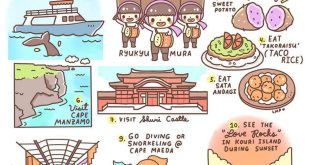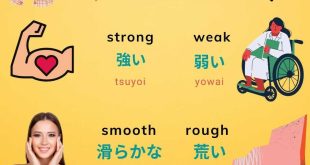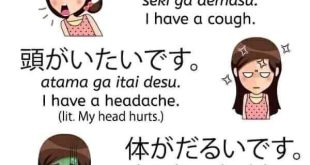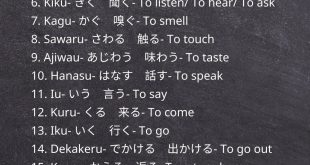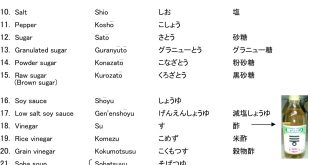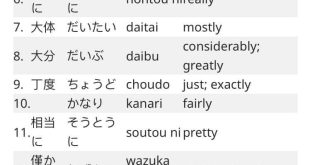Learn to count people and things in Japanese
Counting objects in general ~つ (tsu).
| Kanji | Hiragana | Romaji | Meaning |
| 一つ | ひとつ | hitotsu | one |
| 二つ | ふたつ | futatsu | two |
| 三つ | みっつ | mittsu | three |
| 四つ | よっつ | yottsu | four |
| 五つ | いつつ | itsutsu | five |
| 六つ | むっつ | muttsu | six |
| 七つ | ななつ | nanatsu | seven |
| 八つ | やっつ | yattsu | eight |
| 九つ | ここのつ | kokonotsu | nine |
| 十 | とお | too | ten |
| いくつ | ikutsu | how many |
To count people, you need to use the counter: ~人 (り / にん).
| Kanji | Hiragana | Romaji | Meaning |
| 一人 | ひとり | hitori | one person |
| 二人 | ふたり | futari | two persons |
| 三人 | さんにん | sannin | three people |
| 四人 | よにん | yonin | four people |
| 五人 | ごにん | gonin | five people |
| 六人 | ろくにん | rokunin | six people |
| 七人 | ななにん、しちにん | nananin, shichinin | seven people |
| 八人 | はちにん | hachinin | eight people |
| 九人 | きゅうにん | kyūnin | nine people |
| 十人 | じゅうにん | jūnin | ten people |
| 何人 | なんにん | nannin | how many people |
When we want to know someone’s age, we use the counter: 歳 (さい)
| Kanji | Hiragana | Romaji | Meaning |
| 一歳 | いっさい | issai | one year old |
| 二歳 | にさい | nisai | two years old |
| 三歳 | さんさい | sansai | three years old |
| 四歳 | よんさい | yosai | four years old |
| 五歳 | ごさい | gosai | five years old |
| 六歳 | ろくさい | rokusai | six years old |
| 七歳 | ななさい | nanasai | seven years old |
| 八歳 | はっさい | hassai | eight years old |
| 九歳 | きゅうさい | kyūsai | nine years old |
| 十歳 | じゅっさい、じっさい | jussai, jissai | ten years old |
| 何歳 | なんさい | nansai | how old? |
Count small animals, fish, insects : ~匹 (ひき)
| Kanji | Hiragana | Romaji | Meaning |
| 一匹 | いっぴき | ippiki | one small animals |
| 二匹 | にひき | nihiki | two small animals |
| 三匹 | さんびき | sanbiki | three small animals |
| 四匹 | よんひき | yonhiki | four small animals |
| 五匹 | ごひき | gohiki | five small animals |
| 六匹 | ろっぴき、ろくひき | roppiki, rokuhiki | six small animals |
| 七匹 | ななひき | nanahiki | seven small animals |
| 八匹 | はっぴき、はちひき | happiki, hachihiki | eight small animals |
| 九匹 | きゅうひき | kyūhiki | nine small animals |
| 十匹 | じゅっぴき、じっびき | juppiki, jippiki | ten small animals |
| 何匹 | なんびき | nanbiki | How many |
Counting thin objects 枚(まい)
Applies to thin and flat objects (stamps, sheets…).
| Kanji | Hiragana | Romaji | Meaning |
| 一枚 | いちまい | ichimai | one sheet (pieces) (of paper) |
| 二枚 | にまい | nimai | two sheets (pieces) (of paper) |
| 三枚 | さんまい | sanmai | three sheets (pieces) (of paper) |
| 四枚 | よんまい | yonmai | four sheets (pieces) (of paper) |
| 五枚 | ごまい | gomai | five sheets (pieces) (of paper) |
| 六枚 | ろくまい | rokumai | six sheets (pieces) (of paper) |
| 七枚 | ななまい | nanamai | seven sheets (pieces) (of paper) |
| 八枚 | はちまい | hachimai | eight sheets (pieces) (of paper) |
| 九枚 | きゅうまい | kyūmai | nine sheets (pieces) (of paper) |
| 十枚 | じゅうまい | jūmai | ten sheets (pieces) (of paper) |
| 何枚 | なんまい | nanmai | how many |
Technological objects
The counter 台(だい) (dai) applies to technological objects and vehicles such as cars, bicycles, television sets, MP3 players…
| Kanji | Hiragana | Romaji | Meaning |
| 一台 | いちだい | ichidai | one machine; one vehicle |
| 二台 | にだい | nidai | two machines; two vehicle |
| 三台 | さんだい | sandai | three machines; three vehicle |
| 四台 | よんだい | yondai | four machines; four vehicle |
| 五台 | ごだい | godai | five machines; five vehicle |
| 六台 | ろくだい | rokudai | six machines; six vehicle |
| 七台 | ななだい | nanadai | seven machines; seven vehicle |
| 八台 | はちだい | hachidai | eight machines; eight vehicle |
| 九台 | きゅうだい | kyūdai | nine machines; nine vehicle |
| 十台 | じゅうだい | jūdai | ten machines; ten vehicle |
| 何台 | なんだい | nandai | How many |
Long and cylindrical objects
本(ほん) (hon) meter applies to long and cylindrical objects such as pencils, fingers, trees…
| Kanji | Hiragana | Romaji | Meaning |
| 一本 | いっぽん | ippon | one (long cylindrical thing) |
| 二本 | にほん | nihon | two (long cylindrical things) |
| 三本 | さんぼん | sanbon | three (long cylindrical things) |
| 四本 | よんほん | yonhon | four (long cylindrical things) |
| 五本 | ごほん | gohon | five (long cylindrical things) |
| 六本 | ろっぽん | roppon | six (long cylindrical things) |
| 七本 | ななほん | nanahon | seven (long cylindrical things) |
| 八本 | はっぽん | happon | eight (long cylindrical things) |
| 九本 | きゅうほん | kyūhon | nine long cylindrical things |
| 十本 | じゅっぽん、じっぽん | juppon, jippon | ten (long cylindrical things) |
| 何本 | なんぼん | nanpon | How many |
Very small objects
To count small objects such as paper clips, erasers, dice, croissants…, we use the 個(こ) (ko) counter.
| Kanji | Hiragana | Romaji | Meaning |
| 一個 | いっこ | ikko | one piece; one fragment; one (object) |
| 二個 | にこ | niko | two pieces; two fragment; two (object) |
| 三個 | さんこ | sanko | three pieces; three fragment; three (object) |
| 四個 | よんこ | yonko | four pieces; four fragment; four (object) |
| 五個 | ごこ | goko | five pieces; five fragment; five (object) |
| 六個 | ろっこ | rokko | six pieces; six fragment; six (object) |
| 七個 | ななこ | nanako | seven pieces; seven fragment; seven (object) |
| 八個 | はっこ | hakko | eight pieces; eight fragment; eight (object) |
| 九個 | きゅうこ | kyūko | nine pieces; nice fragment; nice (object) |
| 十個 | じゅっこ、じっこ | jukko, jikko | ten pieces; ten fragment; ten (object) |
| 何個 | なんこ | nanko | how many pieces |
Clothes
The 着 (ちゃく) (chaku) meter applies to clothing.
| Kanji | Hiragana | Romaji | Meaning |
| 一着 | いっちゃく | icchaku | one clothing |
| 二着 | にちゃく | nichaku | two clothes |
| 三着 | さんちゃく | sanchaku | three clothes |
| 四着 | よんちゃく | yonchaku | four clothes |
| 五着 | ごちゃく | gochaku | five clothes |
| 六着 | ろくちゃく | rokuchaku | six clothes |
| 七着 | ななちゃく | nanachaku | seven clothes |
| 八着 | はっちゃく | hacchaku | eight clothes |
| 九着 | きゅうちゃく | kyūchaku | nine clothes |
| 十着 | じゅっちゃく、じっちゃく | jucchaku, jicchaku | Ten clothes |
| 何着 | なんちゃく | nanchaku | how many clothes |
The counter 冊(さつ) (satsu) applies to bound objects such as books, dictionaries, magazines…
| Kanji | Hiragana | Romaji | Meaning |
| 一冊 | いっさつ | issatsu | one (of a book, magazine, etc.) |
| 二冊 | にさつ | nisatsu | two books |
| 三冊 | さんさつ | sansatsu | three books |
| 四冊 | よんさつ | yonsatsu | four books |
| 五冊 | ごさつ | gosatsu | five books |
| 六冊 | ろくさつ | rokusatsu | six books |
| 七冊 | ななさつ | nanasatsu | seven books |
| 八冊 | はっさつ | hassatsu | eight books |
| 九冊 | きゅうさつ | kyūsatsu | nine books |
| 十冊 | じゅっさつ、じっさつ | jussatsu, jissatsu | ten books |
| 何冊 | なんさつ | nansatsu | How many books |
The 足(そく) (soku) counter applies to objects worn on the feet such as socks, shoes…
| Kanji | Hiragana | Romaji | Meaning |
| 一足 | いっそく | issoku | a pair (of shoes or socks) |
| 二足 | にそく | nisoku | two pair (of shoes or socks) |
| 三足 | さんぞく | sanzoku | three pair (of shoes or socks) |
| 四足 | よんそく | yonsoku | four pair (of shoes or socks) |
| 五足 | ごそく | gosoku | five pair (of shoes or socks) |
| 六足 | ろくそく | rokusoku | six pair (of shoes or socks) |
| 七足 | ななそく | nanasoku | seven pair (of shoes or socks) |
| 八足 | はっそく | hassoku | eight pair (of shoes or socks) |
| 九足 | きゅうそく | kyūsoku | nine pair (of shoes or socks) |
| 十足 | じゅっそく、じっそく | jussoku, jissoku | ten pair (of shoes or socks) |
| 何足 | なんぞく | nanzoku | how many shoes |
The counter for floors is 階(かい) (kai)
| Kanji | Hiragana | Romaji | Meaning |
| 一階 | いっかい | ikkai | one floor; one storey |
| 二階 | にかい | nikai | second floor |
| 三階 | さんがい | sangai | third floor |
| 四階 | よんかい | yonkai | four floor |
| 五階 | ごかい | gokai | Fifth floor |
| 六階 | ろっかい | rokkai | Sixth floor |
| 七階 | ななかい | nanakai | Seventh floor |
| 八階 | はっかい | hakkai | Seventh floor |
| 九階 | きゅうかい | kyūkai | Nine floor |
| 十階 | じゅっかい、じっかい | jukkai, jikkai | Tenth floor |
| 何階 | なんがい | nangai | how many floor? |
Numbering
The numbering counter 番(ばん) (ban) is used when objects are numbered, to designate one of them by the number associated with it.
| Kanji | Hiragana | Romaji | Meaning |
| 一番 | いちばん | ichiban | number one |
| 二番 | にばん | niban | number two |
| 三番 | さんばん | sanban | number three |
| 四番 | よんばん | yonban | number four |
| 五番 | ごばん | goban | number five |
| 六番 | ろくばん | rokuban | number six |
| 七番 | ななばん | nanaban | number seven |
| 八番 | はちばん | hachiban | number eight |
| 九番 | きゅうばん | kyūban | number nine |
| 十番 | じゅうばん | jūban | number ten |
| 何番 | なんばん | nanban | what number |
Frequency
For frequency the counter is 回(かい) (kai).
| Kanji | Hiragana | Romaji | Meaning |
| 一回 | いっかい | ikkai | once; one time |
| 二回 | にかい | nikai | twice |
| 三回 | さんかい | sankai | three times |
| 四回 | よんかい | yonkai | four times |
| 五回 | ごかい | gokai | five times |
| 六回 | ろっかい | rokkai | six times |
| 七回 | ななかい | nanakai | seven times |
| 八回 | はっかい | hakkai | eight times |
| 九回 | きゅうかい | kyūkai | nine times |
| 十回 | じゅっかい、じっかい | jukkai, jikkai | ten times |
| 何回 | なんかい | nankai | how many times? |
| 次回 | じかい | jikai | next time |
.
 Learn Japanese Free Learn Japanese Free
Learn Japanese Free Learn Japanese Free

